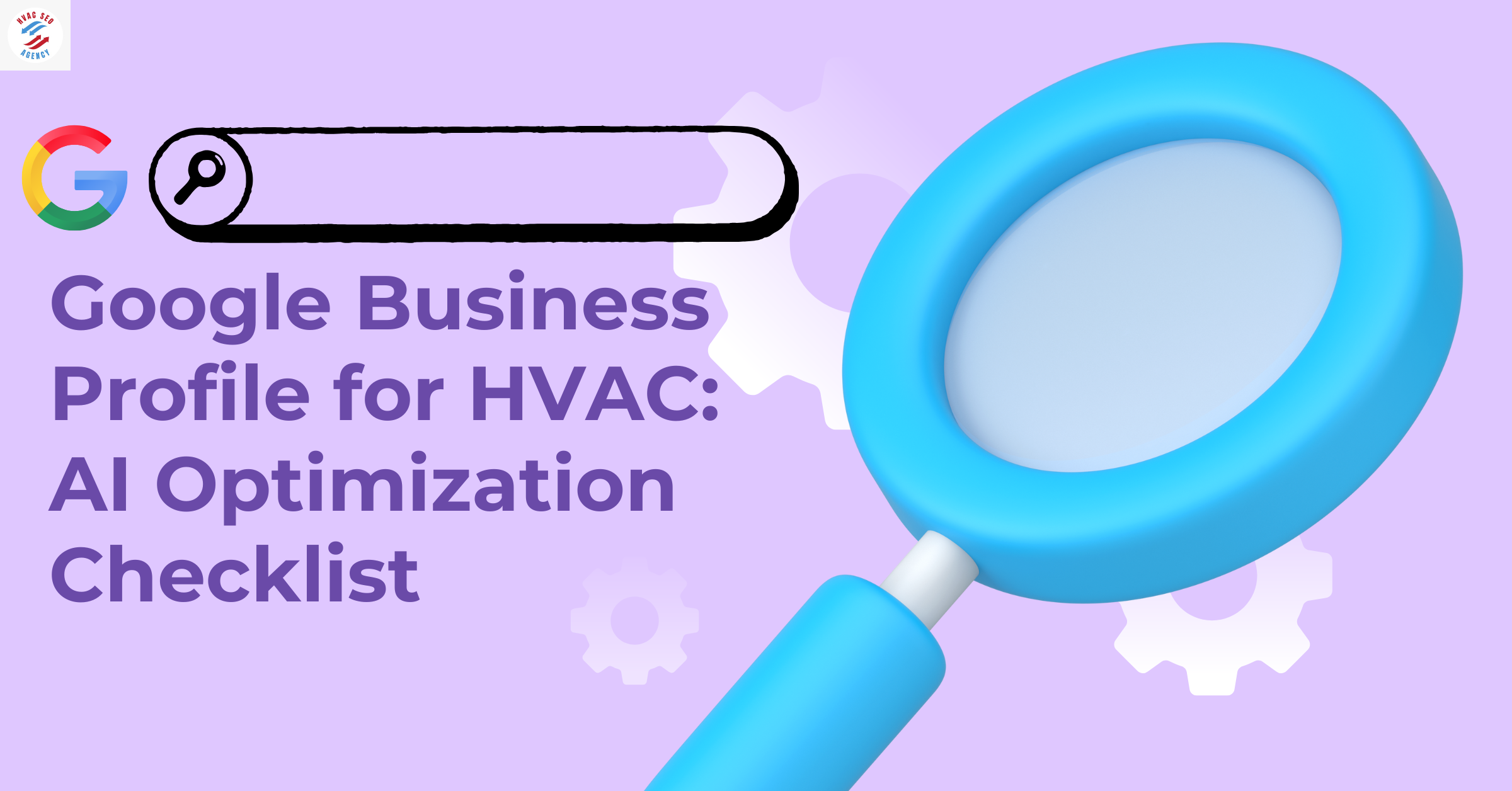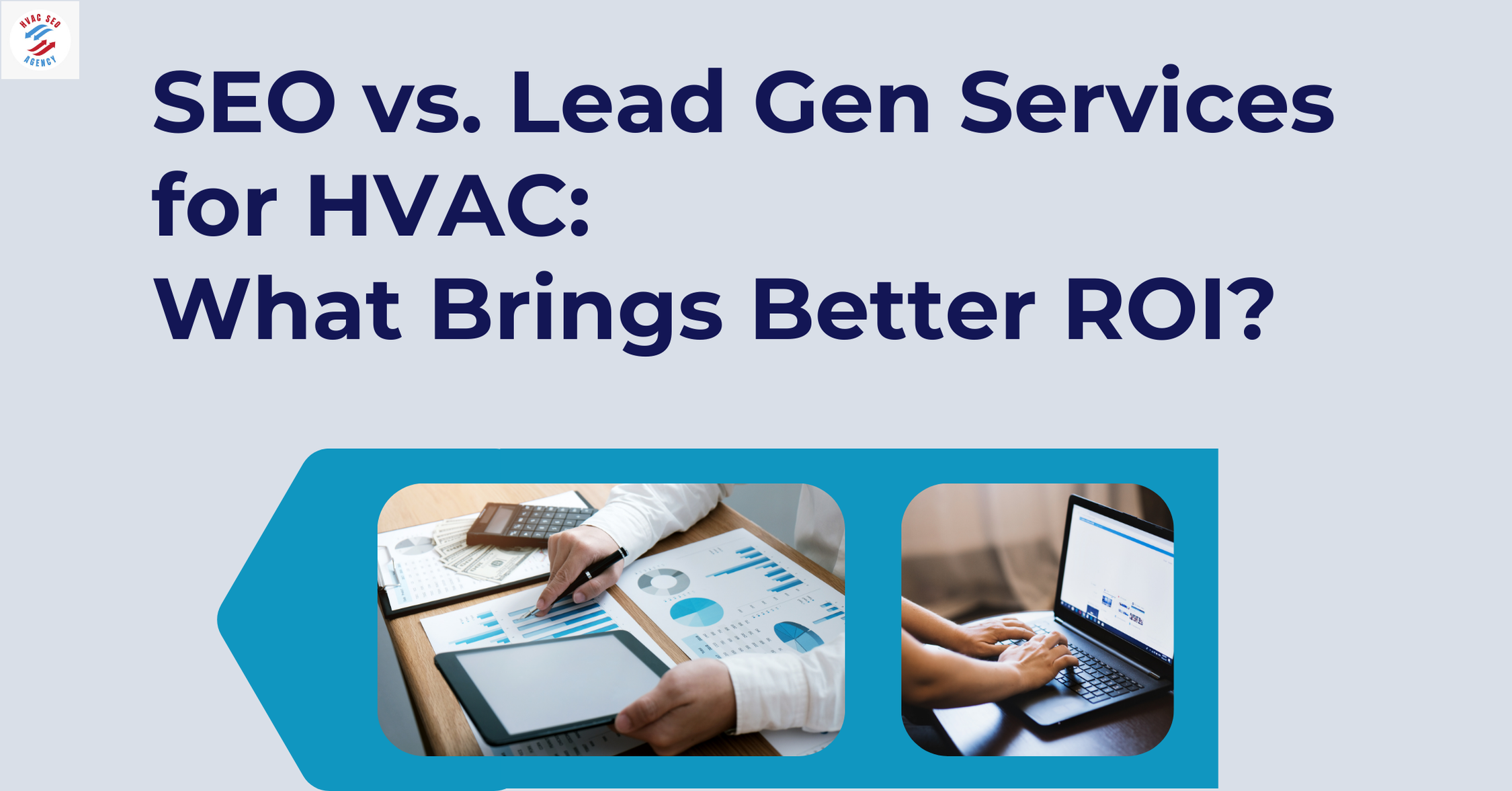How to Choose the Right HVAC Software for Your Business

1.The Growing Need for HVAC Business Management Tools
The HVAC industry in the United States is expanding rapidly, with a projected annual growth rate of 6% (IBISWorld). This increase is driven by the rising demand for energy-efficient heating and cooling systems, smart home integration, and HVAC service automation. However, as businesses grow, managing operations manually becomes a challenge.
Many HVAC companies struggle with scheduling conflicts, billing errors, and inefficient customer management. A study shows that 78% of HVAC businesses using advanced HVAC business management tools experience a 35% boost in operational efficiency. This highlights the importance of choosing the right software to streamline business processes and eliminate common inefficiencies.
Additionally, integrating digital marketing strategies is crucial for HVAC businesses to stay competitive. An Affordable HVAC SEO Agency can help HVAC contractors attract local customers, optimize online visibility, and generate high-quality leads. Investing in both management tools and SEO solutions ensures sustained growth, better client retention, and increased revenue.
The Struggles of Running an HVAC Business Without Software
Without an efficient HVAC business management tool, companies often encounter:
Poor Scheduling & Dispatching: 30% of HVAC businesses lose customers due to scheduling conflicts.
Delayed Invoicing & Payment Issues: Businesses relying on manual invoices suffer from 20% revenue loss due to billing errors.
Lack of Customer Data Management: Nearly 50% of businesses struggle with tracking service history, resulting in poor customer experiences.
Inventory Mismanagement: Without real-time tracking, technicians frequently face stock shortages, leading to service delays.
Inefficient Route Planning: Unoptimized technician dispatching leads to wasted fuel costs and longer service times.
Impact of HVAC Business Management Tools on Business Efficiency
Table 1: Key Benefits of HVAC Software vs. Traditional Management
The Rise of Digital Transformation in HVAC Businesses
Adopting HVAC business management tools allows companies to:
Automate scheduling & dispatching to reduce service delays
Generate invoices instantly and track payments seamlessly.
Improve customer retention with organized service history and CRM
Optimize inventory management to avoid part shortages.
Enhance operational efficiency through data-driven insights.
A case study by Service Titan revealed that an HVAC company using scheduling and invoicing software increased its revenue by 45% within a year, proving the tangible benefits of the right software. Additionally, another report found that businesses using automated dispatching reduced technician idle time by 30%, improving workforce productivity.
Beyond operational efficiency, digital transformation also plays a crucial role in lead generation and customer acquisition. To stay ahead of the competition, HVAC businesses must Create a Winning Lead Generation Funnel for HVAC Businesses by leveraging SEO, PPC, and social media strategies. An optimized sales funnel ensures steady customer flow, increased conversions, and long-term growth in the highly competitive HVAC market.
Why You Need to Choose the Right HVAC Software Now
With the increasing demand for fast, efficient HVAC services, businesses that fail to implement the best HVAC scheduling software and HVAC CRM solutions will struggle to keep up with competitors. Choosing the right software for HVAC invoicing, dispatching, and customer management is not just an option it’s a necessity.
The right HVAC business management software enhances operational control, boosts revenue, and improves overall service quality. It also enables businesses to streamline processes, minimize errors, and offer a seamless customer experience. Additionally, integrating digital tools helps HVAC companies Build a Customer Loyalty Program for HVAC Businesses, encouraging repeat clients through automated follow-ups, exclusive service discounts, and membership plans.
Investing in digital solutions now ensures your HVAC business remains competitive, scalable, and ready for future industry advancements. By combining the right software with customer retention strategies, HVAC businesses can secure long-term growth and success.
2. Key Features to Look for in HVAC Software
Selecting the best HVAC business management tools requires a deep understanding of the features that drive operational efficiency. The right software should enhance job scheduling, invoicing, customer relations, and inventory tracking. Investing in HVAC software tailored to your business needs ensures streamlined workflows, better resource allocation, and improved customer satisfaction.
Job Scheduling & Dispatching: The Heart of HVAC Operations
Poor scheduling leads to missed appointments, technician delays, and unhappy customers. An advanced HVAC business management tool should include:
Drag-and-Drop Scheduling – Assign jobs quickly with an easy-to-use dashboard.
Automated Reminders – Reduce no-shows with SMS/email appointment confirmations.
GPS Tracking for Technicians – Optimize routes and improve response times.
Mobile Access for Technicians – Enables field staff to update job status and access schedules in real time.
Work Order Management – Helps technicians track job details, ensuring smooth execution.
Why It Matters
70% of HVAC companies using job scheduling software report a 40% decrease in missed appointments.
Real-time dispatching can reduce fuel costs by 15%, improving overall efficiency.
Technicians spend 25% less time navigating to job sites with optimized routes.
Best HVAC Scheduling Software
Service Titan – Enterprise-grade scheduling with advanced automation.
House call Pro – Ideal for small HVAC businesses seeking affordability and efficiency.
Jobber – Simple and easy-to-use for startups looking for a no-fuss solution.
Field Edge – Offers seamless integrations with QuickBooks and field service features.
Software for HVAC Invoicing & Payment Processing
Billing is one of the most critical aspects of running a successful HVAC business. Manual invoicing causes revenue leakage, late payments, and administrative inefficiencies. The right software for HVAC invoicing should offer:
Automated Invoicing & Billing – Reduces time spent on payment follow-ups.
Integration with QuickBooks & Payment Gateways – Enables seamless transactions.
Digital Signatures & Instant Quotes – Speeds up service approvals.
Recurring Billing & Subscription Management – Ensures steady revenue for maintenance contracts.
Multi-Payment Options (Credit Card, ACH, Mobile Pay) – Enhances customer convenience.
Why It Matters
25% of HVAC companies struggle with late payments, leading to cash flow problems.
Automated invoicing reduces administrative workload by 50%.
Digital payments result in 40% faster payment processing times.
Top HVAC Invoicing Software
BuildOps – Designed for commercial HVAC companies with advanced invoicing tools.
Jobber – Offers easy invoice customization and digital payments.
House call Pro – Automates invoicing and integrates with major payment systems.
Service Titan – Robust financial management tools with built-in accounting features.
HVAC CRM Solutions for Customer Management
Customer retention is as important as acquiring new clients. A powerful HVAC CRM solution helps you manage customer data, service history, and communication.
Centralized Customer Database – Access customer profiles, past jobs, and future appointments.
Automated Follow-ups & Reminders – Send timely service reminders to boost customer engagement.
Lead Tracking & Sales Pipeline Management – Convert inquiries into paying customers.
Customizable Customer Insights & Reports – Track customer behavior for personalized service.
Integration with Marketing Tools – Run email and SMS campaigns to nurture leads.
Why It Matters
85% of customers prefer businesses that remember their service history.
CRM-integrated HVAC businesses see a 30% increase in repeat customers.
Automated follow-ups boost customer retention rates by 45%.
Best HVAC CRM Solutions
Service Titan – Comprehensive HVAC CRM for large-scale businesses with advanced features.
Jobber – Affordable CRM with essential lead management tools.
House call Pro – CRM with built-in marketing tools to drive customer engagement.
Field Edge – Great for businesses looking to integrate CRM with accounting and dispatching.
By choosing the right HVAC business management software, companies can streamline operations, enhance customer satisfaction, and maximize profitability. Investing in job scheduling, invoicing, and CRM tools is not just about efficiency it’s about staying ahead in a competitive industry.
3. How to Compare HVAC Software: Step-by-Step Guide
Choosing the right HVAC business management tools can be overwhelming with so many options available. To make an informed decision, HVAC business owners must evaluate software based on specific business needs, pricing, features, and integration capabilities. This step-by-step guide will help you systematically compare and choose the best HVAC software for your business.
Identify Business Requirements – Determine if you need scheduling, invoicing, dispatching, or a full-suite CRM solution.
Compare Features – Look for automation, mobile accessibility, and cloud-based capabilities.
Evaluate Pricing – Choose a solution that fits your budget while providing maximum ROI.
Check Integration Capabilities – Ensure compatibility with accounting, marketing, and customer service tools.
Read Reviews & Request Demos – Learn from real user experiences and test the software before committing.
Additionally, pairing the right HVAC software with digital marketing strategies can significantly enhance lead generation. Implementing Local SEO to Get More HVAC Service Calls ensures your business ranks higher on Google searches, driving more organic traffic and customer inquiries. Optimizing for location-based keywords, setting up Google Business Profile, and encouraging customer reviews can further boost your visibility and credibility, helping you convert online visitors into long-term clients.
Step 1: Identify Your Business Needs
Before selecting HVAC business management tools, define your company’s specific operational challenges. Consider:
Business Size – Are you a small HVAC business or a large enterprise?
Core Challenges – Is scheduling your biggest issue, or do you need advanced HVAC CRM solutions?
Budget Constraints – Do you prefer an all-in-one solution or modular software?
Mobile Accessibility – Does the software support technicians in the field?
Table 1: Choosing HVAC Software Based on Business Size
Pro Tip: Small businesses should prioritize affordability and ease of use, while large enterprises may require the best HVAC scheduling software with AI-driven automation and workforce tracking.
Step 2: Compare Features & Pricing
A good HVAC business management tool should provide seamless scheduling, invoicing, customer management, and dispatching.
Job Scheduling & Dispatching – Real-time updates and mobile access.
Software for HVAC Invoicing – Automatic billing, integration with accounting software.
HVAC CRM Solutions – Lead tracking, automated customer communication.
Technician Route Optimization – Reduce fuel costs and improve response times.
Pro Tip: If your priority is fast job scheduling, choose the best HVAC scheduling software like Jobber. If automated invoicing is key, go for software for HVAC invoicing like Housecall Pro.
Step 3: Take Free Trials & Check User Reviews
Most top HVAC business management tools offer free trials. Before committing, test:
User Interface & Ease of Use – Can your team quickly learn the system?
Mobile App Experience – Does it work well for field technicians?
Customer Support Quality – Is there 24/7 support or live chat assistance?
Customization Options – Can you tailor invoices, job statuses, and customer communications?
Best HVAC Software Free Trials Available:
Service Titan – 14-day trial.
Jobber – 14-day trial.
House call Pro – 7-day free demo.
BuildOps – Custom demo upon request.
Pro Tip: Always read user reviews before purchasing. Websites like Capterra, G2, and Trustpilot offer unbiased ratings on the best HVAC scheduling software and CRM solutions. Look for feedback on ease of use, mobile access, and customer support responsiveness.
Step 4: Check for Integration Capabilities
Ensure your HVAC business management tool integrates with:
QuickBooks (for accounting)
Google Calendar (for technician scheduling)
Stripe/PayPal (for payments)
Zapier (for workflow automation)
Best HVAC Software for QuickBooks Integration:
House call Pro
Jobber
FieldEdge
Service Titan
Pro Tip: If you’re already using accounting software, ensure the HVAC software syncs seamlessly to prevent double data entry and invoicing errors.
Step 5: Evaluate Cost vs. Value Return
Pricing matters, but the cheapest software isn’t always the best. Consider:
How much time it saves per week
Whether it improves cash flow (via faster payments)
If it prevents revenue loss from missed jobs
Scalability – Can it grow with your business?
Pro Tip: The right HVAC business management tool should increase profitability by at least 20% through automation and efficiency improvements. Investing in the best HVAC scheduling software can help reduce operational costs while increasing service capacity.
Feature Comparison of Top HVAC Business Management Tools
Final Thoughts on Comparing HVAC Software
To choose the best HVAC business management tools, focus on:
Business Needs – Do you need scheduling, invoicing, CRM, or all-in-one management?
Features vs. Pricing – Don't overpay for features you don’t use.
Free Trials & Reviews – Test before committing to a purchase.
Integration Capabilities – Ensure it works with your existing tools.
Customer Support & Training – A good provider should offer 24/7 support and onboarding assistance.
By following this step-by-step approach, you'll find the best HVAC scheduling software and HVAC CRM solutions tailored to your business growth. The right software investment can help you optimize operations, boost revenue, and enhance customer satisfaction, keeping your HVAC company competitive in a rapidly growing industry.
4. Case Studies: How HVAC Businesses Transformed with the Right Software
Nothing proves the value of HVAC business management tools better than real-world success stories. Below are three case studies of HVAC companies that boosted revenue, reduced operational costs, and improved customer satisfaction after adopting the right HVAC CRM solutions and best HVAC scheduling software.
Revenue Impact of HVAC Software Implementation
Case Study 1: ServiceTitan Helps a $5M HVAC Business Scale Operations
The Problem:
ABC Heating & Cooling, a mid-sized HVAC company with 25 technicians, struggled with:
Missed Appointments – 15% of jobs were lost due to scheduling conflicts.
Slow Invoicing – Manual billing took 5+ hours per week, causing payment delays.
Poor Customer Retention – 20% of clients never booked repeat services.
The Solution:
After switching to Service Titan, the company:
Increased technician efficiency by 40% through real-time scheduling and GPS dispatching.
Reduced admin workload by 60% using automated invoicing and QuickBooks integration.
Boosted customer retention by 35% with CRM-based follow-ups and service reminders.
Integrated mobile solutions, allowing technicians to access job details from the field.
Revenue Impact: The company grew its annual revenue by $1.2M in just 12 months by reducing missed appointments and improving service efficiency.
Case Study 2: House call Pro Helps a Small HVAC Business Save 30 Hours/Month
The Problem:
XYZ Air Solutions, a small business with 5 technicians, faced:
Time-consuming appointment scheduling, leading to technician downtime.
Manual invoicing errors causing late payments and revenue inconsistencies.
Lack of online customer interaction, resulting in low customer retention.
The Solution:
After adopting House call Pro, they:
Reduced scheduling time by 50% with drag-and-drop dispatching and automated job notifications.
Integrated online invoicing, enabling digital payments and automatic follow-ups, which resulted in getting paid 2x faster.
Gained 25% more customers via automated follow-ups, service reminders, and customer review requests.
Streamlined operations using a mobile app, improving job tracking and customer communication.
Time Saved: The business saved over 30 hours per month, allowing them to take on more service calls and increase revenue without hiring additional staff.
Case Study 3: A Large-Scale HVAC Enterprise Adopts Field Edge for Real-Time Tracking
The Problem:
A national HVAC company with 100+ technicians struggled with:
Poor route optimization, leading to excessive fuel costs and delayed service calls.
No real-time tracking for technicians, causing inefficiencies in dispatching.
Complicated invoicing workflows, leading to delayed payments and administrative bottlenecks.
The Solution:
By implementing Field Edge, they:
Cut fuel costs by 20% with AI-powered GPS-based scheduling, optimizing technician routes.
Improved technician efficiency by 35%, reducing time spent traveling between jobs.
Automated invoicing, enabling faster payment collection and reducing delays by 50%.
Integrated QuickBooks and CRM tools, allowing seamless customer communication and financial tracking.
Business Growth: The company saw over $500,000 in annual savings from optimized operations, reduced fuel consumption, and improved invoicing efficiency.
Final Thoughts on Case Studies
These real-world success stories prove that the right HVAC business management tools, best HVAC scheduling software, and software for HVAC invoicing can significantly increase revenue, efficiency, and customer retention.
By choosing the right software solution, your HVAC business can:
Save Time – Reduce administrative work by 50% or more, allowing more focus on service quality.
Increase Profitability – Boost revenue by 20-40% through improved efficiency and customer management.
Improve Customer Satisfaction – Higher customer retention rates and better service experiences.
Enhance Workforce Productivity – Reduce technician downtime and maximize daily job capacity.
Lower Operational Costs – Cut fuel expenses, invoicing delays, and manual paperwork inefficiencies.
Take Action Today: If your HVAC business faces challenges with scheduling, invoicing, or customer management, investing in the best HVAC software can drive long-term success, improve your bottom line, and future-proof your business in a competitive market.
5. The Future of HVAC Software: Trends & Predictions
The HVAC industry is evolving rapidly, and so is the technology behind HVAC business management tools. With AI-powered automation, cloud-based solutions, and mobile-first technology, HVAC companies must prepare for a digital transformation that will shape the future of service delivery.
Companies that adopt the best HVAC scheduling software, software for HVAC invoicing, and advanced HVAC CRM solutions will stay ahead of their competition and boost profitability. Let’s explore the major trends that will define the future of HVAC business management.
Future Trends in HVAC Software Adoption
AI & Automation in HVAC Business Management
How AI is Revolutionizing HVAC Business Management
Artificial Intelligence (AI) and automation are changing the way HVAC businesses operate. AI-powered HVAC business management tools can:
Predict Service Needs – AI analyzes equipment usage and past service records to predict when HVAC systems will require maintenance.
Automate Scheduling – AI assigns jobs based on technician availability, location, and workload, reducing response time.
Improve Customer Interactions – AI chatbots handle service requests, appointment bookings, and customer inquiries, providing instant responses.
Optimize Inventory Management – AI tracks parts usage and automatically reorders stock, ensuring no job delays.
Stat Alert:
AI-driven scheduling software can reduce technician downtime by 35% (Source: HVAC Industry Report 2025).
Automated invoicing solutions reduce late payments by 50%, improving cash flow stability.
AI-based predictive maintenance can cut emergency repair costs by 40%.
Example:
Service Titan’s AI-powered job dispatching feature optimizes technician schedules, ensuring maximum efficiency and fuel savings.
Cloud-Based HVAC Software Adoption
The future of HVAC business management tools is cloud-based. Cloud solutions allow HVAC companies to:
Access Data Anywhere – Real-time job tracking and reporting from mobile devices, tablets, and desktops.
Enhance Collaboration – Seamless technician-office communication via cloud-connected platforms.
Reduce IT Costs – No need for on-site servers or expensive hardware for data storage.
Improve Security – Cloud solutions provide encrypted data protection to prevent cyber threats.
Stat Alert:
By 2027, 80% of HVAC businesses will have transitioned to fully cloud-based software (Source: Market Watch 2024).
Companies using cloud-based software for HVAC invoicing process payments 2x faster than paper-based invoicing.
60% of HVAC businesses reported reduced operational costs after shifting to cloud-based management solutions.
Example:
House call Pro’s cloud-based system allows technicians to generate invoices, collect payments, and update job statuses on the go, eliminating manual paperwork and improving efficiency.
Mobile-First Approach for Field Technicians
With an increasing number of HVAC technicians working in the field, mobile-optimized HVAC software is becoming a necessity. HVAC businesses with mobile-first software experience a 30% increase in efficiency because technicians can:
Receive job notifications instantly, reducing missed appointments.
Upload reports, images, and job updates directly from service locations.
Process invoices and accept payments via mobile apps, minimizing delays.
Access customer history and job details in real time, improving service quality.
Stat Alert:
90% of HVAC technicians prefer mobile-accessible software for real-time job updates.
Mobile-based HVAC CRM solutions improve customer communication by 40% by enabling instant messaging and notifications.
Companies using mobile invoicing tools collect payments 3x faster than those relying on traditional billing.
Example:
Jobber’s mobile CRM app allows technicians to manage customer interactions, scheduling, and invoicing efficiently, significantly reducing service delays and paperwork.
IoT & Smart HVAC Systems Integration
The rise of smart home technology and IoT (Internet of Things) is shaping the future of HVAC services. IoT-connected HVAC systems can:
Enable Remote Diagnostics – HVAC units send real-time alerts when issues arise, allowing businesses to offer proactive maintenance.
Automate Energy Optimization – Smart systems adjust heating and cooling based on usage patterns, reducing energy costs.
Provide Real-Time Performance Monitoring – Technicians can remotely monitor system efficiency, improving service planning.
Stat Alert:
By 2026, over 65% of HVAC systems will be IoT-enabled, allowing remote diagnostics and performance tracking.
HVAC businesses integrating IoT solutions see a 25% decrease in emergency service calls, as problems are detected early.
Customers using IoT-connected HVAC units report a 30% reduction in energy bills due to automated optimization.
Example:
Field Edge integrates IoT-based HVAC monitoring to provide technicians with live data on equipment performance, helping businesses offer preventative maintenance services.
Subscription-Based Service Models
With the rise of predictive maintenance and smart HVAC solutions, many HVAC businesses are shifting to subscription-based service models, offering:
Monthly or yearly HVAC maintenance plans for recurring revenue.
Predictive maintenance services, reducing the need for emergency repairs.
Discounted service rates for subscribers, improving customer retention.
Stat Alert:
40% of HVAC businesses are shifting to subscription-based service models to ensure steady revenue streams.
Customers on maintenance plans are 3x more likely to book additional services, increasing profitability.
Example:
Companies using BuildOps offer automated contract renewals and scheduled service reminders, leading to a 20% increase in repeat business.
Final Thoughts on the Future of HVAC Software
The HVAC industry is on the brink of digital transformation, and businesses that embrace AI, cloud-based solutions, mobile technology, and IoT will gain a significant competitive advantage.
FAQs
1. What is the best HVAC scheduling software for small businesses?
Answer: The best HVAC scheduling software for small businesses includes Housecall Pro, Jobber, and FieldEdge. These platforms offer:
Drag-and-drop scheduling to quickly assign jobs.
Automated customer notifications to reduce no-shows.
Mobile access for real-time job updates.
Housecall Pro is ideal for budget-conscious small businesses, while Jobber offers strong customer management features.
2. How much does HVAC business management software cost?
Answer: The cost of HVAC business management tools depends on business size and required features.
Table: HVAC Software Pricing Comparison
Pro Tip: Many providers offer free trials to test features before committing.
3. What features should HVAC invoicing software have?
Answer: The right software for HVAC invoicing should include:
Automated invoicing and reminders to prevent late payments.Integration with QuickBooks and Stripe for seamless accounting.
Mobile invoicing capabilities for technicians to bill customers on-site.
Top Choice: House call Pro’s one-click invoicing feature speeds up payment processing.
4. Why is HVAC CRM important for customer management?
Answer: HVAC CRM solutions store customer data, track service history, and automate follow-ups
.
Boosts customer retention by 30%.Reduces response time for service calls.
Improves communication with automated reminders.
Example: Service Titan’s CRM tool increases repeat business by 40% through smart customer engagement.
5. How does GPS tracking improve technician dispatching?
Answer: GPS-enabled HVAC business management tools optimize technician dispatching by:
Reducing fuel costs by 20%.
Ensuring the closest technician is assigned to urgent jobs.
Providing real-time job status updates.
Example: Field Edge’s GPS tracking feature improves route efficiency and job completion rates.
Final Thoughts on HVAC Software FAQs
Choosing the right HVAC business management tools depends on your company’s needs. Whether you need the best HVAC scheduling software, software for HVAC invoicing, or HVAC CRM solutions, ensure that your software:
Improves efficiency (less admin work, automated processes).
Boosts profitability (faster payments, optimized technician routes).
Enhances customer satisfaction (fewer missed appointments, better service tracking).
7. Final Thoughts: Making the Right Choice for Your HVAC Business
Choosing the right HVAC business management tools can transform the way your HVAC company operates. From job scheduling and dispatching to automated invoicing and customer relationship management, software solutions are designed to increase efficiency, reduce costs, and improve customer satisfaction.
Companies that integrate the best HVAC scheduling software, software for HVAC invoicing, and HVAC CRM solutions see higher revenue, fewer scheduling conflicts, and better customer retention. But making the right choice requires careful evaluation.
Key Takeaways Before Selecting an HVAC Software
Identify Your Business Needs
Are you a small business needing basic scheduling, or a large enterprise requiring full automation?
Do you need advanced HVAC CRM solutions to manage customer interactions?
Compare Features & Pricing
Best HVAC scheduling software should provide real-time dispatching, GPS tracking, and automated notifications.
Software for HVAC invoicing must include QuickBooks integration, automated payment reminders, and mobile billing.
Test with Free Trials
Sign up for a demo to evaluate ease of use, automation features, and mobile compatibility. Check real user reviews on platforms like G2, Capterra, and Trustpilot.
Ensure Future Scalability
Can the software grow with your business?
Will it integrate with new HVAC business management tools as your company expands?
How the Right HVAC Software Boosts Business Performance
Companies using advanced HVAC business management tools experience:
20-40% higher revenue growth through automation.
50% reduction in scheduling errors with real-time job assignments.
30% improvement in customer retention due to automated CRM follow-ups.
Conclusion: The Future of Your HVAC Business Starts Today
Selecting the right HVAC business management tools is not just about choosing software; it's about future-proofing your business. The right tools will streamline operations, reduce administrative burdens, improve customer service, and boost profitability. Whether you need the best HVAC scheduling software, software for HVAC invoicing, or HVAC CRM solutions, making an informed choice is crucial to staying competitive in the HVAC industry. Partnering with Top HVAC Marketing Experts can further enhance your business by optimizing your digital presence, increasing lead generation, and ensuring long-term growth in a competitive market.
Why the Right HVAC Software is a Game-Changer
Eliminates Scheduling Conflicts: Automates job assignments and dispatching, reducing appointment errors.
Accelerates Payment Processing: Software for HVAC invoicing ensures quick and accurate billing
Enhances Customer Retention: HVAC CRM solutions store service history, automate reminders, and build stronger relationships.
Increases Business Efficiency: Reduces manual paperwork and allows your team to focus on service quality.
Supports Business Growth: Scalable HVAC business management tools grow with your company’s needs.
Fact: Businesses that switch to automated HVAC management software report a 20-40% increase in revenue and 50% higher efficiency.






